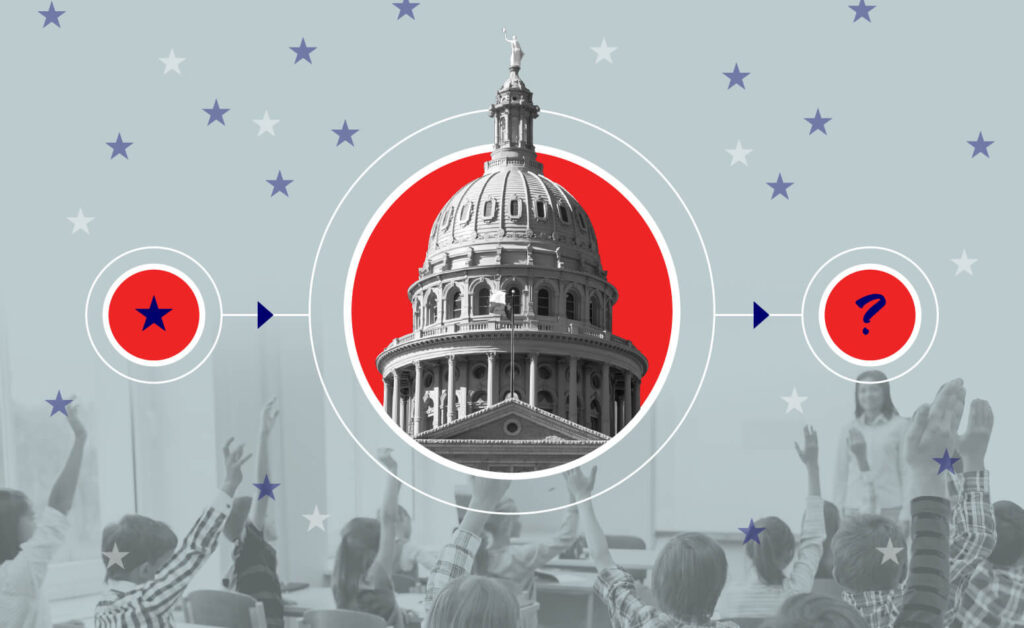What Key Education Legislation Means for Texas Public Educators

The 89th Texas Legislature has officially passed its halfway point, and it’s already shaping up to be one of the most consequential sessions in recent history for public education and educators across Texas. The deadline for legislators to file bills was March 14, and lawmakers filed a record-setting 8,897 bills—5,792 in the House and 3,105 in the Senate. Of those, 2,743 were filed in the final week of bill filing (up over 60% from the last week of bill filing in 2023).
Although several bills aim to enhance student outcomes, others have sparked debate over the expanding role of government, increased administrative burdens, and the growing authority of the Texas Education Agency (TEA). Although the number of bills passed by the Senate so far remains low (as is typical for the midpoint of the session), committee hearings are ramping up, and many impactful bills are moving closer to the House floor for full debate and votes. This is a critical point for public education advocates to engage in several areas. The following list covers major issues but is not comprehensive, and, as always, we encourage to follow ATPE’s TeachtheVote.org advocacy blog for ongoing coverage and analysis.
Public School Funding and Educator Compensation
Both the House and Senate have earmarked funds for public schools, including teacher pay, school safety, special education funding, the teacher pipeline, and early literacy and numeracy initiatives.
House Bill (HB) 2 by House Public Education Committee Chair Brad Buckley (R-Salado), the session’s only general school finance bill, is also the primary driver of educator pay in the lower chamber. Among many things, the bill seeks to raise the per-student Basic Allotment from $6,160 to $6,380 and require school districts to spend at least 40% of the increased funds on teacher and staff raises. While the bill aims to support educators, its critics argue the $220 increase falls short of addressing inflation and existing funding gaps.
While the Senate has no general school finance bill, Senate Bill (SB) 26 by Senate Education K-16 Committee Chair Brandon Creighton (R-Conroe) does propose spending $4.9 billion on teacher pay increases. However, unlike HB 2, which provides some level of compensation increase to all non-administrative campus staff, SB 26 only provides raises to classroom teachers and only to those with three or more years of experience. Additionally, about 20% of the bill’s spending is dedicated to expanding the Teacher Incentive Allotment. ATPE continues to stress that teacher compensation is just one piece of the puzzle. Schools also require additional resources in other areas to stop the loss of programming and campus closures and to support better working environments and student outcomes.
The Governor’s Top Priority: Vouchers
While providing students and educators with the resources they need is clearly the public education community’s top goal for the session, Gov. Greg Abbott (R) has prioritized the creation of Education Savings Accounts (ESAs, aka vouchers) that would allow public funds to be used for private schooling. SB 2 and HB 3 are leading the charge on the voucher front, and while the proponents tout “school choice,” the reality is these bills would do little other than create a new taxpayer-funded entitlement for existing private schools, private school students, and the segment of home school families willing to accept the government intrusion. With no revenue stream to cover the cost, which would start at $1 billion in the first year and is projected to quickly grow to $10 billion or more, the program would likely siphon critical dollars away from already-underfunded public schools.
SB 2, filed by Creighton, mirrors HB 3 by Buckley and has already passed the full Senate.
Classroom Discipline and Teachers’ Rights
Discipline and other issues legislators are grouping under the umbrella of “teachers’ rights” are a major talking point for lawmakers this session. SB 27 by Creighton and HB 6 by Rep. Jeff Leach (R-Plano) aim to give teachers and school districts more authority to address classroom disruptions. While ATPE supports these bills, concerns remain about their implications for student removals, and we have recommended adjustments.
Religion in Schools
SB 10 by Sen. Phil King (R-Weatherford) mandates that public schools display the Ten Commandments in every classroom, while SB 11 by Sen. Mayes Middleton (R-Galveston) allows schools to designate time for prayer and religious expression, including staff participation. Proponents argue these bills aim to restore traditional values, while critics cite First Amendment concerns over government endorsement of religion.
Special Education
SB 568 by Sen. Paul Bettencourt (R-Houston) proposes shifting special education funding from a placement-based model to one based on service intensity. It also calls for increased funding for student evaluations. ATPE supports the bill but testified that the proposed $400 million is insufficient to close the existing $1.9 billion special education funding gap.
Cell Phone Restrictions
HB 1481 by Rep. Caroline Fairly (R-Amarillo) mandates that students keep cell phones stored out of sight during instructional time. This bipartisan initiative is a response to growing concerns about classroom distractions and declining academic performance. ATPE was neutral on the bill but expressed some concerns in testimony to the committee.
Expanded Role of TEA
Many bills this session include provisions that would significantly add to TEA’s footprint. Despite ongoing efforts to improve government efficiency, TEA’s authority continues to grow. If all proposed legislation passes, the agency’s staff could increase by approximately 10%, building on roughly 33% staff growth over the past five years. While increased oversight could lead to more accountability, it also adds to the administrative burden for schools.
Why Staying Engaged Matters
As the session moves into its second half, bills are beginning to hit the House floor. This is the moment when your voice matters most. Whether you are supporting teacher pay increases, opposing school vouchers, or ensuring thoughtful implementation of special education reforms, your elected officials need to hear from you, their constituents—especially educators and public school supporters—to understand how these proposals would play out in real life.
Take Action Now
Call, email, or meet with your local representatives. Using ATPE’s Advocacy Central makes it easy to do so. You don’t have to look up their contact info—just enter your address, write your message, and click send. Tell them how these policies affect your classroom, your students, and your community. Encourage friends and colleagues to do the same. The 89th legislative session ends June 2, and the last day the governor can veto bills is June 22.
The future of Texas public education is being written right now at the Capitol. Let’s make sure educators and students have a strong voice in the process.

Heather Sheffield

Share Your Thoughts
Log in to the ATPE Online Community to communicate with educators from across Texas on this article and much more. Explore the community today!